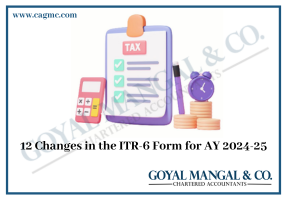
Navigating the tax regulations will be like solving puzzles, mainly in the case of determining non-resident status in India. The article will explain the certain rules for non-residents in India, along with examples. It will help those who spent their time in India and would like to shape their tax status. To better understand and manage the tax by residing in other countries, firstly one needs to understand the non-residential status in India, and certain rules set up by the tax authorities with real-world examples.
Table of content
Brief about Non-resident Indian as per Income Tax Act, 1961
A non-resident is a person or an enterprise that does not meet the needs of a resident in a specific jurisdiction. In the case of individuals, it generally means the number of days live in a country at a specific time like a financial year. The tax regulations of the country decide the duration of stay as below the certain threshold, for an individual who falls under non-resident.
The distinction is significant for tax and legal implications, which ensure that the people are subject to specific laws depending on their level of presence in a provided location. It potentially refers to your primary place of residence or economic interests lying outside the particular country.
Rules for Non-resident in India
Generally, rules for non-resident status in India primarily revolve around the number of days a person is in a country. Here are the new rules for NRI in India:
- 60 Days Rule (with additional conditions): There’s an exception to the 182 days rule. During the financial year, you are in India for 60 days and 365 days or more at the time of four years preceding the particular financial year. Then one can be considered as a resident. On the other hand, in case 60 days rule doesn’t apply to a person, who was in India for 182 days or more in the preceding financial year.
- Less than 182 Days Rule: If an individual is present in India for less than 182 days during a financial year, they are considered a non-resident.
Examples of Non-resident Status in India as per Income Tax Act, 1961
Let’s take real-time examples of non-resident status under the Income Tax Act, 1961:
- Example 1 – Short Stay:
- Rashi, a foreign national, visits India for a business conference and stays for 60 days in a financial year.
- Result: Rashi is a non-resident since her stay is less than 182 days.
- Example 2 – Employment Abroad:
- Manik, an Indian citizen, works abroad and stays in India for only 120 days during the financial year.
- Result: Manik is a non-resident due to his stay being less than 182 days.
- Example 3 – Non-Resident Indian (NRI):
- Romil, an Indian citizen working abroad, comes to India for 90 days in the financial year.
- Result: Romil is a non-resident for tax purposes since he hasn’t crossed the 182-day threshold.
- Example 4 – 60 Days Rule Not Met:
- Meena, an expatriate, is in India for 50 days during the financial year and has not met the conditions of the 60-day rule in the preceding years.
- Result: Meena is a non-resident as she doesn’t meet the 182-day or 60-day rule criteria.
Foreign Direct Investment by NRI in India
End Notes
In conclusion, it can be said that non-resident status in India includes navigating a set of rules. As one embarks on their financial journey, one needs to remember that your residential status isn’t about bureaucracy, but it shapes your legal and tax responsibilities. One can empower themselves to determine the complexity of non-residential status in Indian taxation by following rules and embracing the examples. The examples which are illustrated herein provide a practical lens by which these rules come to life.







